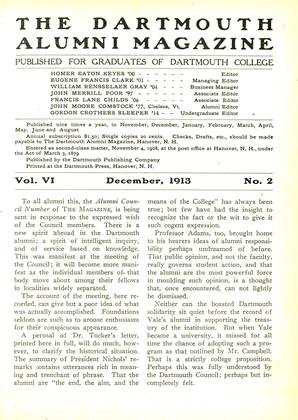The White Hills in Poetry, an anthology, edited by Eugene R. Musgrove '05. Boston, 1912, Houghton, Mifflin Co. $1.75.
Lovers of the hills will turn the leaves of this book with a keen and hopeful interest. If it is put aside with something of disappointment, the cause will lie in no fault of the compiler's, but. in a curious lack in English literature. The sea has its many adequate interpreters, but the hills have yet to find their accepted poet. Messrs. Baker and Ross compiled a few years ago an anthology, "The Voice of the Mountains", drawing on all English poetry. Considered as representing the most faithful rendition of the spirit of the hills, it is quite as sadly disappointing as the volume before us. The reason is plain. For ages the sea has been useful and often friendly to mankind, as well as beautiful, while until less than one hundred years ago mountains were consid- ered "useless, forbidding, and rather ugly. It takes literature a century or so to develop the technique necessary to express a new attitude toward nature. Consider the following from the New Hampshire Register of 1811, and ponder whether it is surprising that the hills are only now beginning to find their adequate interpretation. The paragraph refers to our harmless, graceful Chocorua Mountain:
"In the town of Burton is a horrid precipice called Coraway Mountain, and its summit Coraway Pick, which viewed from Sandwich and Tamworth, has a frightful, barren,' and desolate look."
Mr. Musgrove has selected one hundred and thirty-seven complete poems and some extracts, being in his judgment the best that has been written about the White Mountains and the outlying hills, lakes, and streams of New Hampshire. He has chosen well, and the volume contains more good poetry than one would suppose had been writ- ten about the New Hampshire hills. The volume is very well printed, attractively- bound, and the twenty-nine illustrations are from good photographs reproduced with uncommon success. Elaborate notes of the school text-book sort are appended, showing sometimes the interesting result of a good deal of delving in local history, and Indian lore. The introduction, contributed by Dr. S. M. Crothers, is a delightful bit in his best vein.
Among the fifty-nine poets represented, Whittier, Miss Larcom, and Miss Proctor of course predominate in number of selections. Eight are Dartmouth men, of whom Hovey is most familiar to the general public. Aside from certain familiar stanzas of Whittier's, the reviewer is inclined to regard as most satisfying to the lover of the hills, Gannett's "At the Flume House"; Miss Proctor's "The Hills are Home"; Gilder's "In the White Mountains".
Two small points arouse the reviewer's mountaineering pedantry, or purism: the illustration opposite page eight called Adams and Jefferson looks much more like Madison and Adams; and how could Miss Proctor, even in a poem, assert that the Adirondack Whiteface is seen over Killington from Moosilauke?
The compiler says, "this book had its birth in a conviction that it ought to be". He has justified his conviction. For the lover of New Hampshire uplands it collects the best efforts of those of like mind toward adequate expression, and is therefore welcome. If the mere lover of poetry would, after reading, lay emphasis on the "efforts" let him return to his "Golden Treasury" whence he should never have strayed if only the greatest can please him. Finally, the book appears to have been compiled with a view to possible use as a school text-book in literature, and certainly deserves consideration,- at least by New Hampshire schools, if a cheaper edition is provided. N. L. G.
 View Full Issue
View Full Issue
More From This Issue
-
 Article
ArticleMEETING OF THE ALUMNI COUNCIL
December 1913 -
 Article
ArticleTo all alumni this, the Alumni Council
December 1913 -
 Class Notes
Class NotesCLASS OF 1907
December 1913 By Richard S. Southgate -
 Class Notes
Class NotesLOCAL ASSOCIATIONS
December 1913 -
 Class Notes
Class NotesCLASS OF 1912
December 1913 By Conrad E. Snow -
 Class Notes
Class NotesCLASS OF 1906
December 1913 By Harold G. Rugg
Article
-
 Article
ArticleTHE practical workings of the preceptorial system
FEBRUARY 1906 -
 Article
ArticleD. O. C. Manager
June 1939 -
 Article
ArticleTop Club Secretary
June 1953 -
 Article
ArticleFRESHMAN SPORTS
APRIL 1963 By DAVE ORR '57 -
 Article
ArticleGlass Bangles
DECEMBER 1982 By N.K. -
 Article
ArticleTHE DARTMOUTH CHRISTIAN ASSOCIATION
August, 1912 By Sherwood Trask

